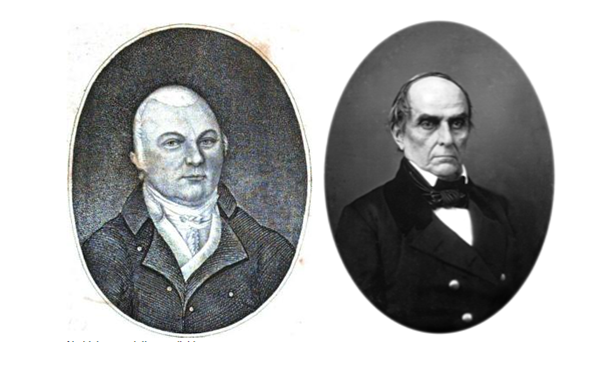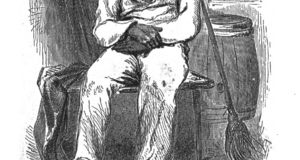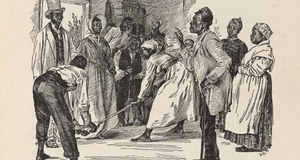The Captain's Compromise: Political Symbolism in Herman Melville's Benito Cereno
By
2019, Vol. 11 No. 01 | pg. 1/1
IN THIS ARTICLE
KEYWORDS
Until the outbreak of civil war, the United States would continually try and fail to subdue the existential threat of slavery, with each attempt exacerbating the sectional tensions between slave and free states. In 1830, Massachusetts Senator Daniel Webster claimed that the country stood on the “precipice of disunion” and foresaw a future in which “the broken and dishonored fragments of a once glorious Union” are drenched in “fraternal blood.”1 As tribalism tore away the shared history between the North and South, Webster’s grim prediction would eventually become the state of national politics. Following the Mexican-American War in 1848, the United States acquired control of California, Arizona, Nevada, and other former Mexican territory. As these regions began to seek entry into the Union, sectional factions wrestled over the future of slavery in these states. Political paralysis struck at the heart of Congress as mainstream political dialogue devolved to threats of secession. In an attempt to avert disunion, moderates in Congress banded together to pass the Compromise of 1850. The legislation admitted California into the Union as a free state, banned the slave trade in the capitol, and, most notoriously, included the heinous Fugitive Slave Act. The “Great Triumvirate” of antebellum statesmen, Henry Clay, John C. Calhoun, and Daniel Webster, dominated the discussion surrounding the Compromise of 1850.2 Herman Melville integrated this national debate into his literary works. Melville published Benito Cereno in 1855 as a fictional account of a slave uprising that took place fifty years prior. On December 22, 1804, West African slaves aboard the Tyral murdered the ship’s crew and ordered Benito Cerreño, their Spanish captain, to set sail for Senegal.3 However, not only did they quickly run out of supplies, their ship crumbled on the rough Pacific waters.4 Stranded at sea, the rebels quickly lost hope for returning home. Their situation quickly changed when they encountered Amasa Delano’s trading vessel, the Perseverance, off the coast of Chile. In a desperate attempt to loot the ship and salvage their freedom, Babo and his son Mori orchestrated a performance by threatening Cerreño to act as their master.5 During his time aboard the Tyral, Delano remained oblivious of the masquerade. The Yankee captain writes about this experience in his memoir, A Narrative of Voyages and Travels, which was widely distributed after its publication in 1818. Melville’s Benito Cereno is based entirely on his account of the events. While Melville makes a few literary adaptations, the novella’s plot remains accurate to the historical record, which has been uncovered by historian Greg Grandin. In this essay, I argue that Melville’s Benito Cereno critiques Daniel Webster’s support for the Compromise of 1850. I highlight similarities between the language of the novella and Webster’s rhetoric during the debate over the resolution to show that Amasa Delano embodied Webster’s moral hypocrisy and political ambivalence. Political symbolism for the Compromise of 1850 appears in many of Melville’s other works. According to literary scholar Alan Heimert, the rhetoric of Webster and Calhoun manifested in Moby Dick. When Melville published the novel in 1851, he predicted that the dangerous waters of secession would engulf the Union, symbolized by the Pequod.6 The Ship of State metaphor emerges again in Benito Cereno. The novella begins with the San Dominick drifting aimlessly off the coast of Chile. “The wind,” as Melville described, “was now extremely light and baffling, which the more increased the apparent uncertainty of her movements.” However, when Amasa Delano first caught sight of the “ship in distress,” he observed that the wind “had headed the vessel off, as well as partly broken the vapours from about her.”7 Like the Pequod, Melville’s depiction of San Dominick closely resembled the fractured Union. On March 7, 1850, Webster declared that “the imprisoned winds are let loose,” which threatened "the precise position of the precious vessel.” The winds of secession “combine[d] to throw the whole sea into commotion.”8 The Union, if it was to endure, must carefully navigate the question of slavery. Webster, who was dubbed “the Godlike Daniel,” attempted to save his country from the “apparent uncertainty” of dissolution.9 Moral CowardiceFor three decades, Henry Clay spearheaded legislation in an attempt to delay the crisis of slavery. However, by 1850, it was clear that perpetual compromise was unsustainable. In 1844, the American Anti-Slavery Society proclaimed that “revolutionary ground should be occupied by all those who [...] do not mean to compromise the principles of justice and humanity.” Under the leadership of William Lloyd Garrison, radical abolitionists operated under the motto of “No Union With Slaveholders.”10 On the other hand, Southern Democrats like John C. Calhoun claimed that if slavery was not allowed to flourish in the West, the South would have no other choice but to secede. Under these circumstances, Daniel Webster would face two gravely undesirable choices: expand slavery or face secession. In 1851, Webster proudly proclaimed that he was “born in the extreme North, bred and brought up in notions altogether irreconcilable to human slavery.”11 As a result, he felt a moral obligation to “firmly, readily, and steadily” oppose the extension of the “ancient, unhappy institution.”12 However, Webster abandoned these convictions during the debate over the Compromise of 1850. In his famed Seventh of March speech, rather than arguing against slavery, he advocated for its expansion. Webster “would rather hear of natural blasts and mildews, war, pestilence, and famine, than to hear gentlemen talk of secession.” To appease Southern slaveholders, Webster condemned Northern abolitionists, who, according to him, “produced nothing good or valuable” for the nation.13 His speech infuriated his constituents back home. According to William Lloyd Garrison, Webster “powerfully shocked the moral sense [and] grievously insulted the intelligence of the people of the North.” Another observer stated that the speech represented Webster’s “greatly troubled conscience on his final act of apostasy from his early New England faith.”14 Not only did he speak favorably of the South, Webster made concessions to them at the expense of Northern independence. In order to pass the Compromise of 1850, Webster rallied behind the Fugitive Slave Act, which was deeply unpopular among his constituents. Not only did the law imprison and fine anyone who fed or sheltered a runaway slave, it conscripted Northerners to aid in their capture. In addition, alleged runaways did not stand trial in front of a judge or jury. Rather, their fates were decided by special commissioners, who were paid ten dollars to find them guilty and five dollars to set them free.15 In the North, the passage of the Fugitive Slave Act heightened fears that the popular will has been supplanted with a Southern slave conspiracy. New York Senator William Seward declared that the “unjust, unconstitutional, and immoral” law insulted “the consciences of our people.”16 In spite of the opposition, Webster claimed that Northerners had a “constitutional obligation” to comply.17 For Webster, failure to do so was tantamount to “treason, treason, treason, and nothing else.”18 His support for the bill tarnished his credibility. John Murray Forbes, a railroad magnate, insisted that Webster had “surrendered to the slave-owners.”19 In addition, Ralph Waldo Emerson declared that he had abandoned “the side of humanity and justice” for Southern position of “abuse and oppression and chaos.”20 The public resentment in the North would force Webster to resign from the Senate later that year. Like Webster, Amasa Delano’s moral hypocrisy perpetuated an institution that he claimed to abhor. A native of Duxbury, Massachusetts, Delano understood the evils of the American slave system. Since his youth, he had been surrounded by progressive thinkers. Gamaliel Bradford, his childhood friend, had expressed sympathy for the “poor innocent creatures, who had been snatched from their peaceful habitations by the rapacious hands of their fellow men, brought to market and sold like beasts.”21 Despite his upbringing, Delano, like Webster, was willing to waiver on the principles of equality and freedom. Melville depicts Delano’s Webster-like declension throughout the novella. At the beginning, the Yankee captain understood that “slavery breeds ugly passions in man.”22 However, after discovering the slave uprising aboard San Dominick, Delano orders his crew to murder the rebels, capture the ship, and, like a Fugitive Slave commissioner, return them back to bondage. Like Webster, Delano’s belief in freedom did not extend to those who were most deprived of it. In a private letter, former Supreme Court Justice Oliver Wendell Holmes, a Boston native, wrote nostalgically about “slavery in its best and mildest form.” “Living among the best people,” he “learned to look upon it with less abhorrence than if he had studied it from a distance.” As a result, Justice Holmes felt no “hatred and opposition to the institution which many Northern children inherited from their parents.”23 In antebellum America, Southern politicians often regurgitated this paternalistic myth. Instead of arguing that slavery was a necessary evil, they portrayed themselves as benevolent father figures and their slaves as consenting servants.24 Amasa Delano also viewed slavery through this lens. According to him, Babo’s “steady good conduct” demonstrated:
Envious of Babo’s “friendship” with his master, Delano offered to purchase him for fifty doubloons, which the “faithful slave” was unwilling to accept.26 Delano believed that a “mild” form of slavery would civilize the people that he compared to Newfoundland dogs.27 The moral failure of Amasa Delano and Daniel Webster was endemic in the North. While slavery had been abolished there for decades, Northerners were complicit in its continuity, both domestically and abroad. New Englanders built ships that traveled the Middle Passage. During his apprenticeship, Amasa Delano worked to export salted cod to Saint-Domingue, which were fed to slaves.28 In 1805, Reverend John Allyn of Duxbury called attention to this hypocrisy, stating that “we, Christians, advocates for liberty and the rights of men, stimulate our appetites and feast our palates, daily, and without remorse, upon luxuries produced [by slaves].”29 While Northerners claimed to stand against slavery, they were unwilling to give up the sugar in their tea or the tobacco in their pipe. Similarly, Daniel Webster was unwilling to forgo his constitutional obligations to recapture fugitive slaves as they fled to the North. Attachment to CivilityMelville introduced Amasa Delano as “a person of a singularly undistrustful good nature, not liable […] to indulge in personal alarms, anyway involving the imputation of malign evil in man.”30 Delano’s “undistrustful good nature” is deeply rooted in his attachment to civility. He considered Don Benito, who was exhibiting antisocial behavior, “ignorant of the first requisites of mere gentlemenhood.”31 However, since he was “unwilling to appear uncivil even to incivility itself,” Delano hoped that Don Benito would eventually offer his “social instinct of kindness.”32 James M. Van Wyck examines the historical manifestations of Benito Cereno and argues that Delano’s demand for civility and “gentlemenhood” did not extend to black people.33 Rather, he expected the Africans to remain docile and submissive. Delano’s unwavering attachment to white civility blinded him to the slave insurrection aboard the ship, which almost cost him his life. Like Delano, Daniel Webster was also “unwilling to appear uncivil even to incivility itself.” He maintained this position throughout his career. In 1830, he stated that his position on slavery was “neither extraordinary nor disrespectful,” which was one that would “attack nobody and menace nobody.” He “did not utter a single word” that would offend “delicate and sensitive point in Southern feeling.”34 This form of civility reverberated in his Seventh of March speech two decades later. Rather than “malign[ing] evil” in slaveholders, Webster claimed that he was “not disposed to reproach these gentlemen, or to speak of them with disrespect.”35 Webster, who felt “great care and kindness” for slaveholders, claimed to “impute to the South no particularly selfish view [and] certainly no dishonest view.”36 He described a proposal to outlaw slavery in the former Mexican territory as “a taunt or a reproach,” one that would “wound the pride of the gentlemen who belong to the Southern states.”37 In addition, he attempted to vindicate Southern slaveholders of any moral culpability. Just as Delano stated that “slavery breeds ugly passions in man,”38 Webster claimed that the Southern slaveholders were victims of the great temptations of “improvement and accumulation,” which were desires that “always influence the human mind and operate upon it.”39 Webster feared that appearing uncivil to Southern slaveholders would exacerbate the sectional tensions that endangered the Union. In the face of grave moral evil, Delano and Webster embodied the social conventions that plagued antebellum America. Their disdain for slavery did not extend to the people that institutionalized it. Rather than condemning slave owners, they sought civil relations with them, which, in turn, legitimized their moral and political position. Race PrejudiceWhile many Northerners opposed slavery, their attempts to abolish the institution were often rooted in white supremacy. When David Wilmot introduced legislation that would outlaw slavery in the newly acquired Mexican territory, he felt “no squeamish sensitiveness upon the subject of slavery, nor morbid sympathy for the slave.” Instead, he pled “the cause of the rights of white freemen.”40 For Wilmot, slavery in Western states would obstruct the profits of free white labor. Delano and Webster were also infected with race prejudice. In 1851, Webster declared that black people were less intelligent and “capable of self-government” than their white counterparts41. While he campaigned on the “equality in the condition of men,” by supporting the Fugitive Slave Act, Webster wielded his “god-like” influence for tyranny and oppression.42 Similarly, despite his well-founded suspicion, Delano thought that the slaves aboard San Dominick were “too stupid” to organize a plot against him.43 He assumed that Don Benito, a white Spaniard, was the natural leader of the ship because black people were debilitated by “the unaspiring contentment of a limited mind.” Instead of recognizing their human capabilities, Delano viewed them as property, incapable of independent thought or desires.44 Babo played into his false perception by acting as “an officious servant with all the appearance of submission of the humble slave.”45 Since the novella is written in Delano’s point of view, the audience was also obvious to the realities aboard the ship. Their failure of perception is representative of the widespread racism of this time period. In 1835, Alexis de Tocqueville, a French diplomat, observed that “the prejudice of race appears to be stronger in the states that have abolished slavery than in those where it still exists.”46 Northern states promulgated scientific racism to justify strict racial segregation. By crafting a character who is ignorant of his own ignorance, Melville exposed the hypocrisy of Northern race relations. Ignoring the IssueFollowing the capture of the San Dominick, Don Benito spoke with Delano about his experiences aboard the slave ship. In an attempt to comfort his friend, Delano asked “the past is past; why moralize upon it? Forget it […] What has cast such a shadow upon you?” Don Benito, traumatized by Babo’s enslavement, answered “the Negro.”47 The conversation ended as the two men sat in silence. This scene captures the mainstream political dialogue of antebellum America. Instead of “moralizing” on the injustice of slavery, proponents of the 1850 resolution attempted to ignore the issue altogether. In his Seventh of March speech, Webster insisted that he “will not state what might produce the disruption of the Union.” Rather than “dwelling in those caverns of darkness,” he urged the country to “enjoy the fresh air of Liberty and Union” and asks his fellow Senators to restore the “harmony which make the blessings of this Union so rich.”48 Like Webster, Henry Clay asked his colleagues to accept his resolution and move past the issue of slavery. In a speech on the Senate floor, Clay acknowledged that the North and the South had “bitter words, bitter thoughts, unpleasant feelings toward each other in the progress of this great measure.” He asked the country to “forget them.”49 Rather than dwelling on those sectional differences, Webster and Clay asked the nation, just as Delano asked Don Benito, to forget “the Negro” and “[turn] over new leaves.” 50 On March 4th, 1850, three days before Webster’s speech and a few weeks before his final breath, John C. Calhoun stated that the country cannot “be saved by eulogies on the Union, however splendid or numerous.”51 Despite Calhoun's proclamation, Webster refused to confront the issue of slavery. He believed that the problem would resolve itself as the North and South continue to compromise. After the passage of the resolution, Webster expected the talk of secession to end. In 1851, he asked a crowd in Syracuse, New York:
However, unbeknownst to Webster at the time, those “petty distinctions” would culminate in a bloody civil war a decade later. The “heart of a true American” was not big enough to accommodate the opposite sides of the slavery debate. As Calhoun predicted, unless the moral differences between the North and South are resolved, secession was inevitable. ConclusionThe failed moral leadership that precipitated during the Compromise of 1850, in the words of Melville, “foreshadow[ed] deeper shadows to come.”53 When the country debated over secession in 1850, nobody could imagine the ensuing carnage. The trials of war forever altered the nation. The retired novelist witnessed a generation of Americans slaughtered on the battlefield. As a result, during the period of Reconstruction, Melville abandoned his once cherished principles and adopted the moderate creed of Daniel Webster. In Battle Pieces and Aspects of the War, he reminded the nation that “benevolent desires, after passing a certain point, can not undertake their own fulfillment without incurring the risk of evils beyond those sought to be remedied.”54 He asked the country to nationalize “the great qualities of the South, those attested in the War.”55 After their surrender, Southern states instituted black codes and literacy tests to deprive former slaves of their promised freedom. However, Melville opposed the Republican Party’s attempt to protect their voting and civic rights. Instead, he supported President Johnson’s plan to restore status quo ante, which, in comparison, was very lenient to the former Confederacy.56 Melville hoped that the country would mend its wounds and unite peacefully under a common flag. By adopting the views that he condemned Webster for espousing, Melville failed to recognize that “the Negro” shadow still clouded the nation. Like the leaders that supported the Compromise of 1850, postbellum America forgot, ignored, and suppressed their plea for equality. To this day, the country fails to recognize that “the past is past” for everyone except “the Negro.”57 Endnotes1.) Daniel Webster, “Second Reply to Hayne.” 26 Jan. 1830, United States Senate, senate.gov/artandhistory/history/resources/pdf/WebsterReply.pdf. 2.) Elizabeth R. Varon, Disunion! The Coming of the American Civil War, 1789-1859, (Chapel Hill: University of North Carolina Press, 2010), 217. 3.) Greg Grandin, The Empire of Necessity: Slavery, Freedom, and Deception in the New World, (New York: Henry Holt and Company, 2014), 173. 4.) Ibid., 212. 5.) Ibid., 2. 6.) Alan Heimert. “Moby-Dick and American Political Symbolism.” American Quarterly, vol. 15, no. 4, (1963), JSTOR, www.jstor.org/stable/2710971, 534. 7.) Herman Melville, Benito Cereno, (New York: Putnam's Monthly, 1855), 354. 8.) Daniel Webster, “The Constitution And The Union,” 7 Mar. 1850, United States Senate, senate.gov/artandhistory/history/resources/pdf/Webster7th.pdf. 9.) Robert V. Remini, Daniel Webster: the Man and His Time, (New York: W.W. Norton & Co., 1997), 29. 10.) American Anti-Slavery Society. “Declaration of Sentiments of the American Anti-slavery Society,” (New York: 1833), Library of Congress, https://www.loc.gov/resource/rbpe.11801100. 11.) Daniel Webster & Edward Everett, The Writings and Speeches of Daniel Webster, Volume 13, (Boston: Little, Brown, & Company, 1903), 421. 12.) Webster, The Writings and Speeches of Daniel Webster, 258; Ibid., 410. 13.) Webster, “The Constitution and the Union.” 14.) Remini, Daniel Webster, 672. 15.) Mintz & McNeil, “The Fugitive Slave Law,” Digital History. Accessed 10 September 2018. 16.) William H. Seward, “"Speech of William H. Seward, on the admission of California: delivered in the Senate of the United States, March 11, 1850" Internet Archive, https://archive.org/details/williamhspeech00sewarich/page/n3. 17.) Webster, “The Constitution and the Union.” 18.) Webster, The Writings and Speeches of Daniel Webster, 419. 19.) Remini, Daniel Webster, 676. 20.) Ibid., 681. 21.) Grandin, The Empire of Necessity, 80. 22.) Melville, Benito Cereno, 409. 23.) John Torrey Morse, Life and Letters of Oliver Wendell Holmes, Volume 1, (Cambridge: Riverside Press, 1899), 303. 24.) Carrie T. Bramen, American Niceness: A Cultural History, (Cambridge: Harvard University Press, 2017), 254. 25.) Melville, Benito Cereno, 357. 26.) Ibid., 459. 27.) Ibid., 467. 28.) Grandin, The Empire of Necessity, 83. 29.) Ibid., 82. 30.) Melville, Benito Cereno, 353. 31.) Ibid., 364. 32.) Ibid., 365; 357. 33.) James M. Van Wyck, “Benito Cereno and the Impossibility of Civility.” The New England Quarterly, vol. 88, no. 3, (2015), 423. 34.) Webster, “Second Reply to Hayne.” 35.) Melville, Benito Cereno, 353; Webster, The Writings and Speeches of Daniel Webster, 435. 36.) Webster, “The Constitution and the Union”; Van Wyck, Benito Cereno and the Impossibility of Civility, 432. 37.) Webster, The Writings and Speeches of Daniel Webster, 281. 38.) Melville, Benito Cereno, 409. 39.) Webster, The Writing and Speeches of Daniel Webster, 274. 40.) Christopher J. Olsen, The American Civil War: A Hands-On History, (New York: Hill and Wang, 2007), 16. 41.) Webster, The Writings and Speeches of Daniel Webster, 513. 42.) Ibid., 278. 43.) Melville, Benito Cereno, 462. 44.) Grandin, Empire of Necessity, 8. 45.) Melville, Benito Cereno, 640. 46.) Tocqueville, Alexis de, Democracy in America, American Studies at the University of Virginia, xroads.virginia.edu/~hyper/detoc/1_ch18.htm. 47.) Melville, Benito Cereno, 643. 48.) Ibid., 288. 49.) Calvin Colton, The Speeches of H. Clay,( New York: A.S. Barnes & Co., 1857), 565. 50.) Melville, Benito Cereno, 643. 51.) John C. Calhoun, “The Causes By Which The Union Is Endangered.” Civil War Causes, www.civilwarcauses.org/saddress.htm. 52.) Webster, The Writings and Speeches of Daniel Webster, 407. 53.) Melville, Benito Cereno, 353. 54.) Herman Melville, Battle-Pieces and Aspects of the War, (New York: Harper & Brothers, 1866), 269. 55.) Ibid., 267. 56.) W. C. Harris, E Pluribus Unum: Nineteenth-Century American Literature & the Constitutional Paradox, (Iowa City: University of Iowa Press, 2005), 117. 57.) Melville, Benito Cereno, 643. Suggested Reading from Inquiries Journal
Inquiries Journal provides undergraduate and graduate students around the world a platform for the wide dissemination of academic work over a range of core disciplines. Representing the work of students from hundreds of institutions around the globe, Inquiries Journal's large database of academic articles is completely free. Learn more | Blog | Submit Latest in Literature |



















